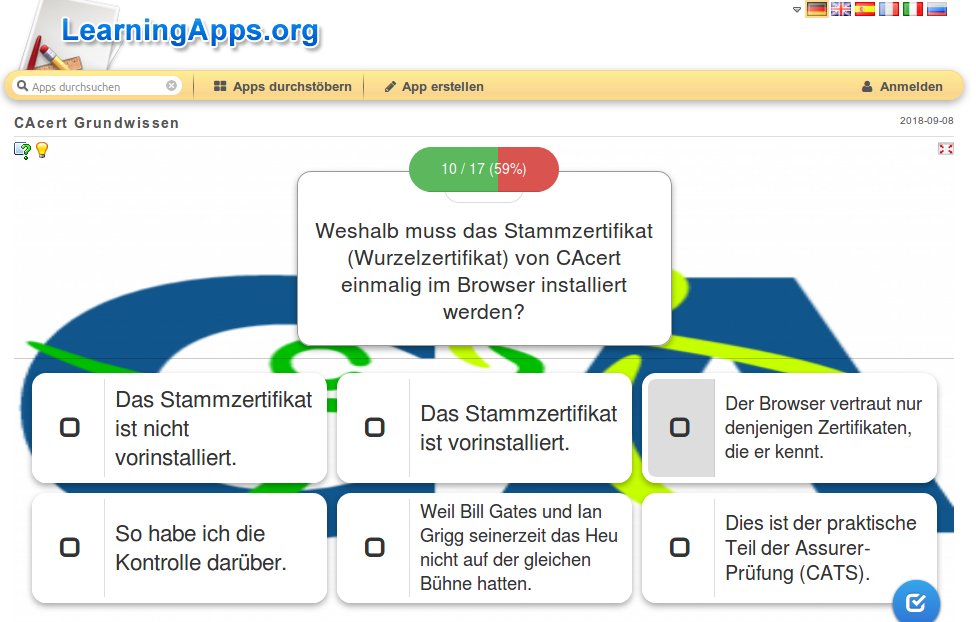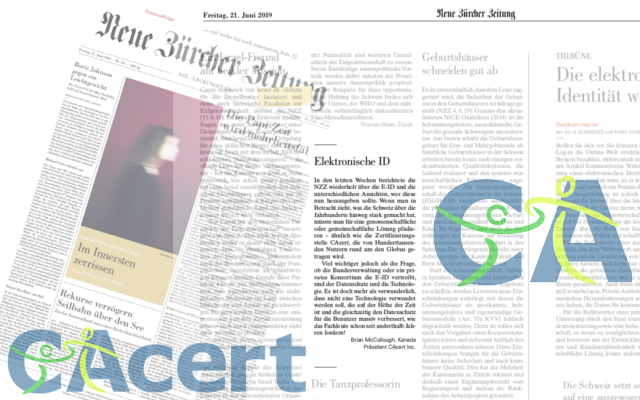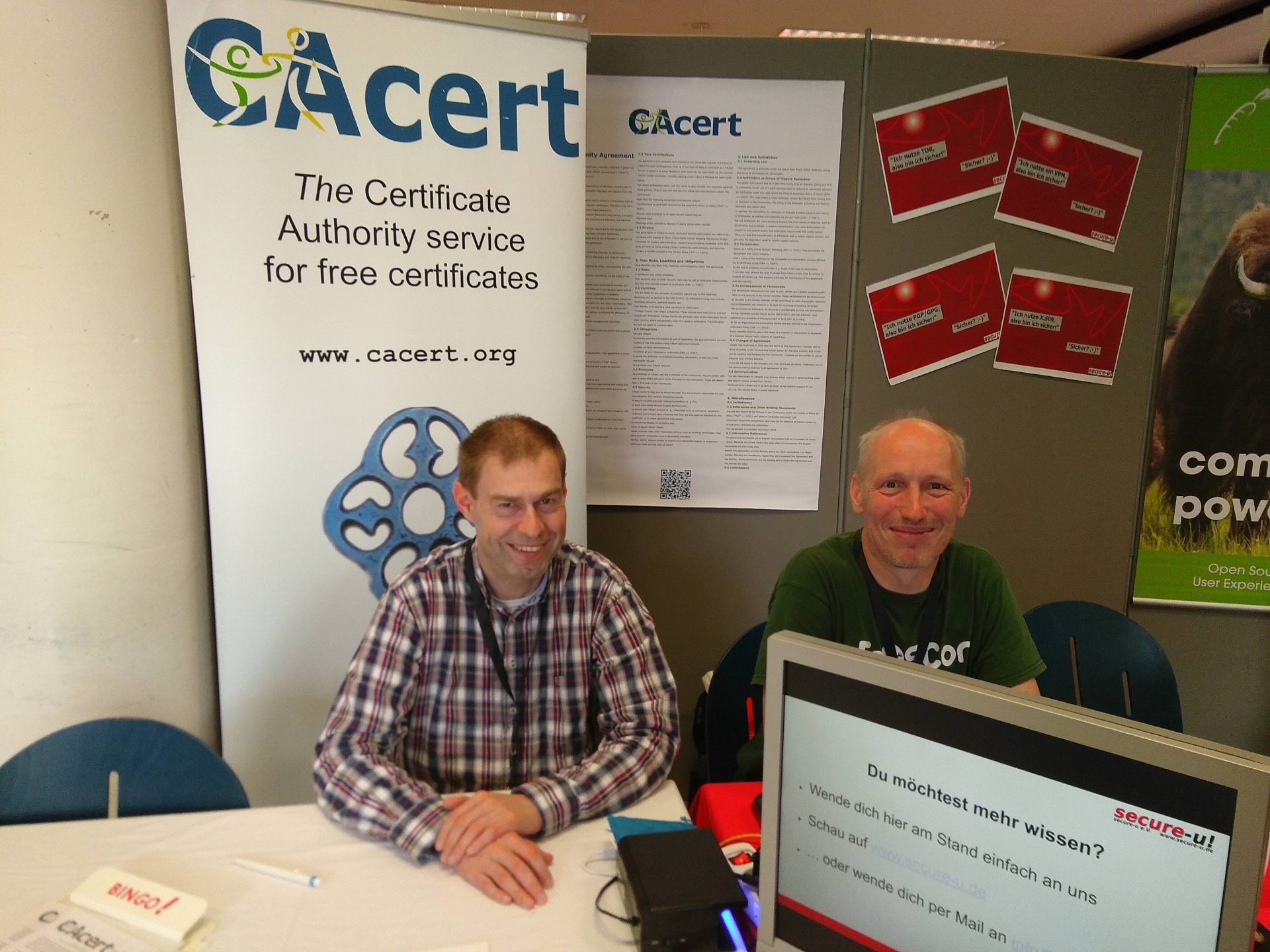 Our treasurer tries to owe donations personally. Now we have learned from our German support association secure-U e.V. that many European CAcert supporters have made use of the possibility to transfer donations directly to their bank account. Also a big thank you to all these donors, even if we don’t know them by name!
Our treasurer tries to owe donations personally. Now we have learned from our German support association secure-U e.V. that many European CAcert supporters have made use of the possibility to transfer donations directly to their bank account. Also a big thank you to all these donors, even if we don’t know them by name!
Tag Archives: CAcert
Merci mille fois pour votre soutien !
 Notre trésorier s’efforce de répondre personnellement à de nombreux donateurs. Secure-U, l’association allemande qui accueille les dons par virement bancaire en Euros au bénéfice de CAcert, nous a averti qu’un grand nombre de donateurs nous ont soutenus par ce moyen. Nous ne les connaissons pas personnellement, mais voulons leur dire ici notre gratitude.
Notre trésorier s’efforce de répondre personnellement à de nombreux donateurs. Secure-U, l’association allemande qui accueille les dons par virement bancaire en Euros au bénéfice de CAcert, nous a averti qu’un grand nombre de donateurs nous ont soutenus par ce moyen. Nous ne les connaissons pas personnellement, mais voulons leur dire ici notre gratitude.
Much response from CAcert’s community mailing
 If you have an account with CAcert you probably received a mail from the board of CAcert Inc. a little over two weeks ago, about the current state of CAcert. We are happy to announce that we received a lot of replies, with many offers to support CAcert with work, as well as a significant amount of monetary donations. There were over 70 offers to help with systems administration, and there is still a trickle of inflow!
If you have an account with CAcert you probably received a mail from the board of CAcert Inc. a little over two weeks ago, about the current state of CAcert. We are happy to announce that we received a lot of replies, with many offers to support CAcert with work, as well as a significant amount of monetary donations. There were over 70 offers to help with systems administration, and there is still a trickle of inflow!
So, first of all, a big thank you to all responders, for giving us some confidence in our opinion that the CAcert project still has its merits in this world. If you volunteered as a system administrator or for another job, please be a bit patient with us, as we have to sort, evaluate and categorise all applications and decide on a specific way to continue and a specific place where each person can help. And, please, don’t be disappointed if you are not chosen for your favourite job. As you can probably guess, we won’t be able to provide sensible work for over 70 sysops!
On the other hand, we hope that many of those people can help out with Customer Support jobs. If you are looking for a way to join CAcert’s workforce even if you don’t specialize in systems or network administration, https://wiki.cacert.org/comma/Workbench/HelpNeeded has been updated to give an overview on the teams and work areas of CAcert.
It really feels like there’s some fresh enthusiasm in the community! We hope to keep up the momentum.
Thank you,
Brian McCullough
President, CAcert, Inc.
For the Board of CAcert, Inc.
Das durchschlagende Echo unseres Briefes an die Gemeinschaft!
 Wie alle, die ein Konto bei CAcert haben, müssen Sie vor etwas mehr als zwei Wochen eine E-Mail vom Vorstand der CAcert Inc. erhalten haben, in der die aktuelle Situation von CAcert beschrieben wird.
Wie alle, die ein Konto bei CAcert haben, müssen Sie vor etwas mehr als zwei Wochen eine E-Mail vom Vorstand der CAcert Inc. erhalten haben, in der die aktuelle Situation von CAcert beschrieben wird.
Wir freuen uns, Ihnen mitteilen zu können, dass wir Hunderte von Antworten von Ihnen erhalten haben, mit vielen Vorschlägen, um uns beim Weiterbetrieb von CAcert zu unterstützen, sowie einer beträchtlichen Menge an Geldspenden. Allein im Bereich der IT-Systemadministration haben wir mehr als hundert Hilfestellungen erhalten.
Unser Dank gilt in erster Linie allen unseren Gesprächspartnern der letzten Tage, deren Botschaften uns Hoffnung geben, dass die Präsenz von CAcert in unserer Welt noch einen Sinn hat. Wenn Sie uns gesagt haben, dass Sie uns als Systemadministrator helfen oder in eine andere Aufgabe mitarbeiten möchten, danken wir Ihnen im Voraus für Ihre Geduld, zu einer Zeit, in der wir alle Antworten sortieren, bewerten und kategorisieren müssen, aber auch darüber nachdenken, wie wir Sie am besten begrüßen können und gemeinsam die Aktivität wählen, bei der jeder am nützlichsten ist. Wir hoffen, dass jeder versteht, dass wir Sie nicht alle einladen können, die Position einzunehmen, die Sie am meisten anzieht; wir können schwerlich mehr als hundert Systemadministratoren Arbeit anbieten! Wir hoffen, dass eine große Mehrheit von Ihnen sich dafür entscheidet, uns bei anderen wichtigen Aufgaben zu unterstützen, wie z.B. bei der Bearbeitung und Lösung von Problemen, auf die Benutzer stoßen.
Wir laden alle ein, die erwägen, einem unserer operativen Teams beizutreten, ohne sich speziell auf die Netzwerk- oder Systemadministration zu konzentrieren, einen Blick auf die Seite https://wiki.cacert.org/comma/Workbench/HelpNeeded zu werfen; diese Seite, die kürzlich aktualisiert wurde, beschreibt einen vollständigen Überblick über die bestehenden Bereiche und Teams von CAcert.
Es sieht wirklich so aus, als sei in unserer Gemeinschaft eine neue Begeisterung erwacht! Wir hoffen, diese Feuer weiter anzufachen.
Mit unserem größten Dank
Brian McCullough
Präsident, CAcert, Inc.
Für den Vorstand von CAcert, Inc.
L’écho retentissant de notre courier adressé à la communauté !
 Comme tous ceux possédant un compte chez CAcert, vous avez dû recevoir un email du comité de direction de CAcert Inc., il y a un peu plus de deux semaines, décrivant la situation actuelle de CAcert.
Comme tous ceux possédant un compte chez CAcert, vous avez dû recevoir un email du comité de direction de CAcert Inc., il y a un peu plus de deux semaines, décrivant la situation actuelle de CAcert.
Nous sommes ravis d’annoncer avoir reçu vos réponses par centaines, accompagnées de très nombreuses propositions pour nous aider à faire fonctionner CAcert, et accompagnées aussi d’un montant non négligeable de dons en numéraire. Dans le seul domaine de l’administration de nos systèmes informatiques, plus d’une centaine de propositions d’aide nous sont ainsi parvenues, et le compteur continue à grimper!
Notre gratitude va en premier lieu à tous nos interlocuteurs de ces derniers jours, dont les messages nous donnent l’espoir que la présence de CAcert a encore un sens dans notre monde. Si vous nous avez fait part de votre souhait de nous aider en tant qu’administrateur système, ou de vous investir dans une autre tâche, nous vous remercions d’avance de votre patience, en ce moment où nous devons trier, évaluer et classer par catégories chacune de vos candidatures, mais aussi réfléchir à la meilleure façon de vous accueillir et de choisir ensemble l’activité où chacun se rendra le plus utile. Nous espérons que chacun comprendra que nous ne pouvons tous vous inviter à occuper la fonction qui vous attire le plus. Comme vous vous en doutez, nous sommes bien incapables d’offrir un travail à plus d’une centaine d’administrateurs système! En disant cela, nous espérons qu’une grande majorité d’entre vous fera le choix de nous aider à d’autres tâches, par exemple en traitant et résolvant les incidents rencontrés par les utilisateurs.
Nous invitons tous ceux envisageant de rejoindre une de nos équipes opérationnelles, sans pour autant viser spécifiquement l’administration réseau ou système, à consulter la page https://wiki.cacert.org/comma/Workbench/HelpNeeded ; cette page, récemment mise à jour, décrit un aperçu complet des métiers et des équipes existants à CAcert.
Il serait difficile de ne pas voir l’enthousiasme renouvelé qui est manifesté par les membres de notre communauté. Nous espérons pousser ce mouvement de l’avant.
Avec nos remerciements.
Brian McCullough
Président, CAcert, Inc.
Pour le comité de CAcert, Inc.
Wissen vertiefen mit der CAcert-App
 Wie gut kennen Sie die freie Zertifizierungsstelle CAcert.org? Testen Sie Ihr Wissen mit dieser LearningApp innert weniger Minuten: Grundwissen CAcert (öffnet in neuem Fenster)
Wie gut kennen Sie die freie Zertifizierungsstelle CAcert.org? Testen Sie Ihr Wissen mit dieser LearningApp innert weniger Minuten: Grundwissen CAcert (öffnet in neuem Fenster)
Was halten Sie von so aufbereiteten Informationen? Sollten Ihrer Meinung nach mehr Themen von CAcert in Apps aufbereitet werden? Wenn ja: welche? Bitte schreiben Sie Ihre Meinung unten ins Kommentarfeld!
Die App läuft auf learningapps.org, einer Lernplattform, die aus den Reihen der pädagogischen Hochschule Bern, der Universität Mainz und der Fachhochschule Zittau/Görlitz gegründet worden ist. Google Analytics kann ausgeschaltet werden.
Unterstützen Sie CAcert im täglichen Bemühen für mehr Sicherheit im Internet mit einem einmaligen oder einem regelmässigen Beitrag an die Betriebskosten. Bitte Spenden Sie jetzt, damit CAcert auch morgen und nächstes Jahr noch die Sicherheit im Internet erhöhen kann. Danke.
CAcert présent en Allemagne avec Secure-U, au Froscon 2019
La conférence FrOSCon se déroulait les 10 et 11 août derniers, près de Cologne en Allemagne. Elle était hébergée par l’Université des Sciences Appliquées Bonn-Rhein-Sieg. CAcert y était présent au coté de Secure-u, son partenaire en Allemagne depuis des années.
Cette conférence annuelle est l’occasion pour CAcert de rencontrer ses membres et utilisateurs, et plus généralement de présenter son approche de la certification des identités réelles à un public convaincu de l’attrait des solutions basées sur les logiciels libres. Sur un plan humain, la rencontre a donné lieu à bien des échanges sympathiques.
Cet évènement fut aussi l’occasion pour les membres les plus actifs de se mobiliser pour son organisation. Merci à eux !
L’infrastructure de CAcert se prépare pour le futur
 Samedi passé, le 13 juillet 2019, dans une opération coordonnée, les équipes Infrastructure et Interventions Critiques de CAcert ont mis à jour avec succès le système d’opération de notre infrastructure, localisée en Hollande. Le système repose désormais sur la version Buster de Debian, version déclarée stable la semaine passée par le projet Debian.
Samedi passé, le 13 juillet 2019, dans une opération coordonnée, les équipes Infrastructure et Interventions Critiques de CAcert ont mis à jour avec succès le système d’opération de notre infrastructure, localisée en Hollande. Le système repose désormais sur la version Buster de Debian, version déclarée stable la semaine passée par le projet Debian.
[this blog post is in French – for English, see here]
Déroulement de l’opération
Les équipes ont démarré leur travail ce matin vers 9:30 CEST et achevé toutes les mises à jour à 16:30 HAEC. Certaines de nos applications n’ont été rétablies qu’un peu plus tard. L’ensemble de nos systèmes est à présent revenu à son fonctionnement optimal.
Quelles améliorations en découlent?
La mise en service d’une version moderne du système d’exploitation, dont dépend toute notre infrastructure, garantit pour le futur un fonctionnement meilleur de nos applications:
- La technologie de containers LXC est ainsi passée de la version quelque peu anti-diluvienne 0.8.0 pre-release à la version 3.0.3, qui offre désormais une API bien définie, une sécurité améliorée, et qui sera beaucoup plus facile à manipuler pour les administrateurs de nos applications.
- Le pare-feu et la translation d’adresses devraient avoir été accélérés, par rapport à ce que parvenait à faire l’ancienne configuration iptables. Nous continuons à utiliser ferm comme wrapper, mais l’équipe Infrastructure de CAcert envisage déjà son remplacement par des règles nftables natives, qui offriront une analyse du trafic aussi sûre mais plus rapide.
- On peut retrouver sur notre liste de discussion d’autres détails de cette importante mise à jour.
Le leader de l’équipe Infrastructure de CAcert, JanDD, a fait part de sa grande satisfaction d’avoir vu s’accomplir enfin cette mise à niveau cruciale, offrant une solidité accrue de nos services aux membres de notre communauté. Dans un commentaire publié en fin d’après-midi, il remerciait chaleureusement Wytze, leader de l’équipe des Interventions Critiques, pour l’apport de sa compétence tout au long de la journée.
Les bénévoles dont sont formées ces deux équipes ont ainsi délivré un travail en continu pendant 7 heures et demi aujourd’hui samedi, pour pérenniser nos systèmes. Joignez-vous à nous pour les en remercier et marquez votre soutien par un don à l’association [x]. Les dons collectés sont exclusivement destinés à couvrir le coût de notre infrastructure (hébergement des serveurs sur site sécurisé et consommation électrique). “Par ma contribution financière, j’encourage le travail de Jan et Wytze; c’est ma façon de leur dire merci”.
Si vous observiez un dysfonctionnement consécutif à cette récente mise-à-jour, n’hésitez pas à nous en faire part sur https://bugs.cacert.org/ (suivre les onglets “Infrastructure” >
“Infrastructure hosts”).
Si vous cherchez à rejoindre l’une de nos équipes techniques, abonnez-vous à la liste de discussion de nos développeurs, ou contactez directement notre secrétaire.
CAcert’s infrastructure ready for the future
 On saturday, 13th of July 2019, in a joint operation, CAcert Infrastructure Team and CAcert Critical Team updated the operation system of CAcert’s infrastructure in the Netherlands sucessfully. The system is now running on the Debian Buster OS release that has been released by the Debian project last weekend.
On saturday, 13th of July 2019, in a joint operation, CAcert Infrastructure Team and CAcert Critical Team updated the operation system of CAcert’s infrastructure in the Netherlands sucessfully. The system is now running on the Debian Buster OS release that has been released by the Debian project last weekend.
Timing
The teams started this morning at around 9:30 CEST and finished the upgrades at 16:30 CEST, some of our applications turned back to service afterwards. The system is running smoothly now.
What is new?
The new OS release provides some features that are important for our infrastructure and will allow better operation of our applications in the future:
- LXC has been upgraded from the somewhat primitive 0.8.0 pre-release to LXC 3.0.3 that has a proper API, better security and which will help application administrators
- Firewalling/forwarding/NAT should now be faster then the old iptables setup. We still use ferm as a wrapper but the CAcert Infrastructure Team is already considering switching to native nftables rules that will provide a similar but faster rule set.
- Further details about this major update can be read on our mailing list.
CAcert Infrastructure Team Lead JanDD is happy that we could finish this big upgrade and that we could implement all these changes for you. In a statement made on the early saturday evening, he thanked again to Wytze from CAcert Critical Team for his great support during the day.
The volunteers from these two teams worked for seven and a half hours today, Saturday, to keep our systems up to date. Join us in thanking them and donate now at your own discretion. Your donation will only be used to pay for the infrastructure (hosting, electricity in the data center). «I say thank you to Jan and Wytze and their team with a donation!»
If you find any issues that might be caused by the upgrade feel free to file bugs on https://bugs.cacert.org/ (at project Infrastructure > Infrastructue hosts).
If you want to join one of our teams, please join the development mailing list or write to the secretary.
Überholte Technologie ist keine Basis für Datensicherheit
 Soll ein Land seine elektronische Identitätskarte (E-ID) selber editieren oder das Ganze an ein privates Konsortium auslagern? Darüber kann man in der Tat geteilter Meinung sein.
Soll ein Land seine elektronische Identitätskarte (E-ID) selber editieren oder das Ganze an ein privates Konsortium auslagern? Darüber kann man in der Tat geteilter Meinung sein.
Hingegen darf es beim Datenschutz keine Abstriche geben. In der Schweiz wird darüber heftig diskutiert. Die Regierung ist offenbar der Meinung, eine bereits überholte Technologie genüge. CAcert unterstützt die Meinung der Experten, wie eine Zuschrift ihres Präsidenten in der angesehenen Neuen Zürcher Zeitung von 21. Juni 2019 eindeutig zeigt.
The Swiss government is obviously of the opinion that an outdated technology is sufficient for an E-ID. CAcert supports the opinion of the experts, as a letter from its president in the reputated newspaper Neue Zürcher Zeitung clearly shows.
Unterstützen Sie CAcert im täglichen Bemühen für mehr Sicherheit im Internet mit einem einmaligen oder einem regelmässigen Beitrag an die Betriebskosten. Bitte Spenden Sie jetzt, damit CAcert auch morgen und nächstes Jahr noch die Sicherheit im Internet erhöhen kann. Danke.

